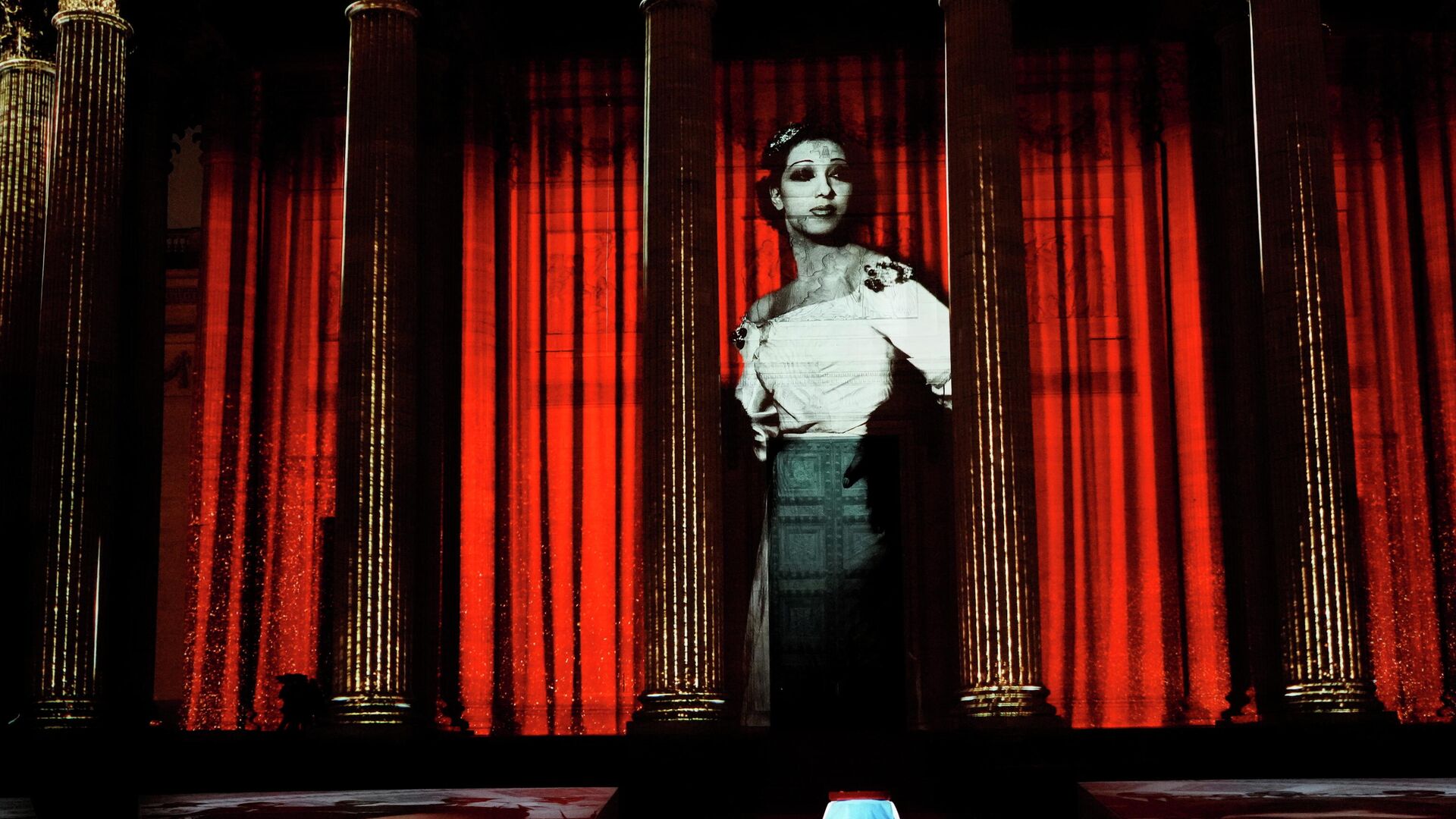https://sputnikglobe.com/20211130/josephine-baker-becomes-first-black-woman-honored-at-pantheon-in-paris-1091155468.html
Josephine Baker Becomes First Black Woman Honored at Pantheon in Paris
Josephine Baker Becomes First Black Woman Honored at Pantheon in Paris
Sputnik International
The American-born French entertainer was honored for her longstanding influence on French culture, as well as her role as a spy during World War II. She... 30.11.2021, Sputnik International
2021-11-30T21:35+0000
2021-11-30T21:35+0000
2021-11-30T21:44+0000
france
society
https://cdn1.img.sputnikglobe.com/img/07e5/0b/1e/1091155441_0:0:3072:1728_1920x0_80_0_0_57ce311552019c1f4fae3ae1a02f4901.jpg
Selection for inclusion in the Pantheon is reserved for national heroes of the French republic.Born Freda Josephine McDonald in St. Louis, Missouri in 1906, Josephine Baker came to define the music and dance traditions of her adopted homeland of France, which she immigrated to in 1925 at the age of 19 and where she stayed until dying at the age of 68 in 1975. Baker once famously sang "I have two loves: my country and Paris."Baker served as a spy during World War II, using her fame to hob-knob with German, Japanese, and Italian dignitaries in order to gather information. As the book “Jazz Age Cleopatra” describes, Baker “specialized in gatherings at embassies and ministries, charming people as she had always done, but at the same time trying to remember interesting items to transmit.” For her efforts during the war, Baker received the Croix de Guerre, Rosette de la Resistance, and Commemorative Medal for Voluntary Service in Free France.Baker also spoke at the Lincoln Memorial during the historic 1963 March on Washington, alongside Dr. Martin Luther King, Jr. and other civil rights leaders. Baker was the only woman to speak at the event, and she sported her Free French uniform emblazoned with her medal of the Légion d'honneur, the highest French order of merit both military and civil, bestowed on her by French President Charles de Gaulle.Baker had refused to perform in front of segregated audiences in the United States during the civil rights movement, and was even offered unofficial leadership of the movement by Coretta Scott King, widow of Dr. Martin Luther King Jr. after her husband was assassinated. Baker turned down the offer, fearing for the safety of her children.Baker’s actual body will remain buried in Monaco at the request of her family. Instead, the Pantheon will contain a coffin featuring handfuls of dirt from four significant locations in her life: St. Louis, Paris, Monaco, and Château des Milandes, her chateau home in southwestern France.The date of the internment is on the anniversary of Baker receiving French citizenship in 1937. The ceremony itself featured a military orchestra, a rousing rendition of the national anthem, and a choir of children singing one of Baker's own songs, according to CNN.
france
Sputnik International
feedback@sputniknews.com
+74956456601
MIA „Rosiya Segodnya“
2021
Sputnik International
feedback@sputniknews.com
+74956456601
MIA „Rosiya Segodnya“
News
en_EN
Sputnik International
feedback@sputniknews.com
+74956456601
MIA „Rosiya Segodnya“
Sputnik International
feedback@sputniknews.com
+74956456601
MIA „Rosiya Segodnya“
france, society
Josephine Baker Becomes First Black Woman Honored at Pantheon in Paris
21:35 GMT 30.11.2021 (Updated: 21:44 GMT 30.11.2021) The American-born French entertainer was honored for her longstanding influence on French culture, as well as her role as a spy during World War II. She becomes the first Black woman to be granted a tomb in the Pantheon in Paris, just the sixth woman so honored, and the 80th French citizen inducted overall since the reign of Napoleon.
Selection for inclusion in the Pantheon is reserved for national heroes of the French republic.
Born Freda Josephine McDonald in St. Louis, Missouri in 1906, Josephine Baker came to define the music and dance traditions of her adopted homeland of France, which she immigrated to in 1925 at the age of 19 and where she stayed until dying at the age of 68 in 1975. Baker once famously sang "I have two loves: my country and Paris."
Baker served as a spy during World War II, using her fame to hob-knob with German, Japanese, and Italian dignitaries in order to gather information. As the book “Jazz Age Cleopatra” describes, Baker “specialized in gatherings at embassies and ministries, charming people as she had always done, but at the same time trying to remember interesting items to transmit.” For her efforts during the war, Baker received the Croix de Guerre, Rosette de la Resistance, and Commemorative Medal for Voluntary Service in Free France.
Baker also spoke at the Lincoln Memorial during the historic 1963 March on Washington, alongside Dr. Martin Luther King, Jr. and other civil rights leaders. Baker was the only woman to speak at the event, and she sported her Free French uniform emblazoned with her medal of the Légion d'honneur, the highest French order of merit both military and civil, bestowed on her by French President Charles de Gaulle.
Baker had refused to perform in front of segregated audiences in the United States during the civil rights movement, and was even offered unofficial leadership of the movement by Coretta Scott King, widow of Dr. Martin Luther King Jr. after her husband was assassinated. Baker turned down the offer, fearing for the safety of her children.
Baker’s actual body will remain buried in Monaco at the request of her family. Instead, the Pantheon will contain a coffin featuring handfuls of dirt from four significant locations in her life: St. Louis, Paris, Monaco, and Château des Milandes, her chateau home in southwestern France.
The date of the internment is on the anniversary of Baker receiving French citizenship in 1937. The ceremony itself featured a military orchestra, a rousing rendition of the national anthem, and a choir of children singing one of Baker's own songs, according to
CNN.



